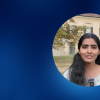
For over 45 years, the IIASA Young Scientists Summer Program (YSSP) has offered opportunities for PhD students to learn about systems analysis and hone their professional skills at IIASA. As this year’s summer term comes to an end, IIASA science writer Vladimir Tarakanov interviewed Amrutha G.S., 2024 YSSP participant and Kirit Parikh Fellow, to learn more about her experiences at the Institute this summer.
Amrutha is a student at the International Institute for Population Sciences in Mumbai, India, currently pursuing a PhD in demography. In June 2024, traveling to Europe for the first time, she joined the YSSP to work on a project evaluating the impact of air pollution on the wellbeing of people in India. Her broader research interests include the impact of population growth and urbanization on greenhouse gas emissions and pollution, the impact of extreme weather events on child wellbeing, and the impact of an aging population on the environment.
Prior to joining IIASA, Amrutha worked as a researcher in India, although she admits that her ultimate goal is to become a university professor as she greatly enjoyed teaching applied demography in the past. She learned about the YSSP from one of her colleagues who previously participated in the program.
“The YSSP is famous among students in my field of research,” she explains. “It is different from other programs — IIASA gives you the opportunity to do your own research and work on your own projects.”
When asked about her time at IIASA, she says that her colleagues and mentors were a tremendous help, motivating her to quickly adapt to the working life at the Institute and to make progress on her project.
Instead of using traditional measures of human development, such as the Human Development Index (HDI) or the Multidimensional Poverty Index (MPI), her project uses a framework developed by IIASA scientists — the Decent Living Standard — which focuses on material requirements at the household, community, and national scales. Over the course of her three months in the YSSP, Amrutha developed what she calls “the first step” — a district-level panel dataset, which will act as a foundation for her further research.
“When I joined, all I wanted was a solid plan for my PhD. I had some good ideas, but did not know how to implement them. Being a part of the YSSP helped me materialize my thoughts,” says Amrutha. “I also got to meet a lot of people from different countries around the world with different research interests, and had many opportunities to exchange knowledge and skills.”
YSSP and the Jyoti and Kirit Parikh Fellowship
Every year since 1977, IIASA has hosted around 50 doctoral students as part of its renowned Young Scientist Summer Program. The participants undertake a scientific project within the scope of their PhD on a topic related to the IIASA research agenda. Most of the Institute's Member Organizations provide special grants to enable young scientists to participate in the YSSP; however, there are alternative funds and other sources to finance their participation as well.
Among these is the Jyoti and Kirit Parikh Fellowship established in 2018 through a generous gift from IIASA alumni Profs. Jyoti and Kirit Parikh, which aims to provide much-needed support for talented researchers from India and other developing countries to participate in the YSSP.
“This fellowship enabled me to come and work here at IIASA for the entire period of the program, granting me the opportunity to network with other scientists, as well as to further develop my skills as a researcher,” concludes Amrutha. “I am very thankful for this opportunity and would be happy to return for another three months next summer.”
Note: This article gives the views of the author, and not the position of the IIASA blog, nor of the International Institute for Applied Systems Analysis.